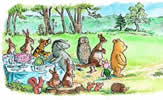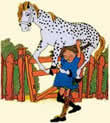
"we read to know wer're not alone"
- c.s. lewis
Welcome to English 2F, Children's Literature. I am your instructor, Erin Crook. You can call me Erin. It's not because I don't like the last name "Crook", which is a great name. I prefer to be called Erin because before I taught English I was a preschool teacher for more than a decade in various schools around the Bay Area. If my 2- year old students can call me by my first name, I reckon my adult students can do the same.











WHEN WAS THE LAST TIME YOU GOT LOST IN A BOOK?
My History with Books, by Erin Crook
1. love
Like many folks, I was a rabid reader as a young child. Looking back, I realize that my reading habits were as much a defense mechanism as anything else. I grew up in Illinois, in a household with eight children, two adults and various animals. In the temperate months, the chaos of such an upbringing was bearable, even enjoyable in many ways, because we had lots of space to spread out. In the winter months, however, we could not go outside for more than a few minutes at a time or we would stop feeling our fingers and toes. With so many bodies in one small house, and so much competition for space and attention, it became necessary to find retreats from the incessant noise of a big family.
I spent many, many hours tucked into the shadowy corners of many crackly fires, with the wind howling and the snow piling up outside, and me oblivious, buried in a book. I still have memories of books and characters that are as vivid as any "real" experience I ever had - and I've had more than my share of strange experiences
.
2. mistrust
From the start, I saw no connection between what I read at home for pleasure, and what they made me read at school. Most of what was put in front of me was not worth the time it took to read. I learned to read on Dick-and-Jane-type books and phonics worksheets. It was a rare teacher who assigned a piece of real literature, a book that I could take home and lose myself in. The only teacher I remember now is Miss Simonson, who later became Mrs. Canon, a whimsical coincidence that still delights me. Every afternoon she'd dim the lights and read to us: books, plays, stories, songs, poetry. We could follow along with our own copies or just listen to her tell the story in the dim, quiet room. Her class was one of the only times from my childhood when school and learning came together, and I am still grateful for that time.
As I reached adolescence, my mistrust of teachers and school increased in proportion to my interest in other pursuits. The books that had once made me lose myself for hours at a time, I now considered juvenile and silly. I quit reading altogether. By the time I graduated from high school, my reading consumption consisted of song lyrics and the occasional Cosmo article.
3. rediscovery
Long story, short: I moved from Illinois to California when I was eighteen, and after a few years of working odd jobs and living rather aimlessly, I had a moment of clarity and went back to school. I didn't know what I wanted to do; I just wanted something different than what I was doing. I completed the basic gen ed stuff, and went looking for an elective that wouldn't prove too time-consuming. I saw a Children's Lit class in the schedule, thought of the books of my youth, and enrolled on a rather nostalgic impulse. One of the assignments was to read Treasure Island. It was one of the books that Miss Simonson had read out loud while I followed along so many years ago. I opened the book on a rainy Santa Cruz morning, and didn't stop reading until mid-afternoon. I emerged from the book as if from a trance, and had a moment of confusion about who and where I was.
It was unsettling to me to have such an experience. It woke me up. I spent the next decade researching childhood literacy, what motivates children to learn to read, and what messages lie in the literature we write for and about them. I earned degrees in Child Development and English along the way, with a special emphasis on children's lit. I took detours into comparative religion, art, psychology, sociology, chemistry, and anthropology as I studied. The more I learned, the more convinced I became that this field is among the most important we can study, not only because children need enthusiastic, educated advocates to help them become literate, but because children's literature offers us a look into our own lives, our own learning process, our own history and stories as individuals, and our shared experience as human beings.
4. teaching
Children's Lit is my favorite class to teach. I can't believe I'm getting paid to do this. While I try to weave in elements of other disciplines in my other writing classes (for example, I assign Harry Potter to all my 1B classes), there is no other class that allows for a book list like the one you have this semester. I have a long list of items to discuss, and I await with great anticipation your fresh perspectives, ideas and questions.
My teaching style is influenced by the core belief that students are responsible for their own education, in and out of the classroom. You have the right and responsibility to orchestrate your own experience, and that's doubly true in this class. You will determine your own level of participation and engagement with the material and the other students. You will take the initiative to follow your own interests, in your own style. There are a few universal rules of etiquette that must be followed, and some basic class requirements, which are discussed in the course description, but beyond that, my ideas for the class are outlines only. We will determine the trajectory of the class as we go, and you will be partially responsible for navigating. Your frank input and engagement is critical to the success of the class.